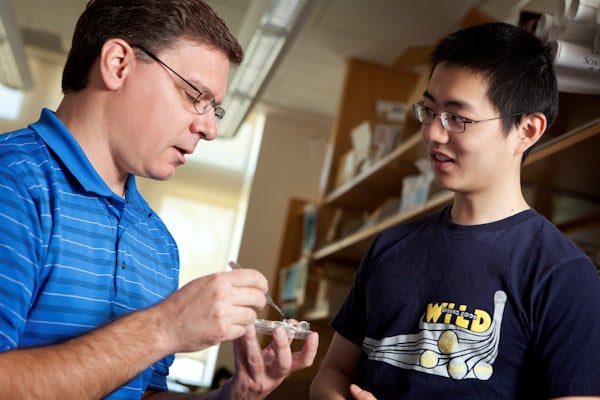NIH grant awarded to create neurotech training program
The program will train students to use engineering tools to develop technology and solutions that address neurological issues

The National Institutes of Health has awarded Daniel Moran, professor of biomedical engineering in the McKelvey School of Engineering, more than $1 million over five years to create the Translational Neuroscience and Neurotechnology Training Program.
This interdisciplinary program will train students to use engineering tools to develop technology that address neurological issues such as stroke, traumatic brain injury, depression and addiction and neurodegenerative disorders such as Parkinson’s disease and dementia. The grant supports five students in biomedical engineering, electrical engineering or computer science doctoral programs per year.
“The collaboration between the BME department and neural sciences faculty at the School of Medicine has been strong and vibrant for decades,” Moran said. “We want to replicate this interaction with both the electrical engineering and computer science departments.
“Engineers are problem solvers,” he said. “We have seen growth in the need to apply engineering principles to problems of neuroscience.”
The 29 faculty mentors in the training program represent a broad range of those advancing neurotechnology and translational neuroscience research from the McKelvey School of Engineering, Arts & Sciences and the School of Medicine.
Students in the program track will take part in a yearlong journal club to prepare them for advanced coursework at the medical school in neural systems, followed by a summer boot camp covering necessary background in advanced computational courses in electrical engineering and computer science. Students are expected to participate after the first two years of graduate school.
While in the program, students also will work closely with the Center for Innovation in Neuroscience and Technology directed by Eric C. Leuthardt, MD, professor of neurosurgery and of biomedical engineering in McKelvey Engineering, and sit in on innovation sessions. Students will collaborate on projects, submit ideas for intellectual property generation and build prototypes.
“Students will be able to come out of this program with the know-how to turn ideas into devices or company startups,” Moran said. “There’s so much good neuroscience going on here. By embedding students into these labs, they will be able to translate neural engineering principles to the clinic.”




